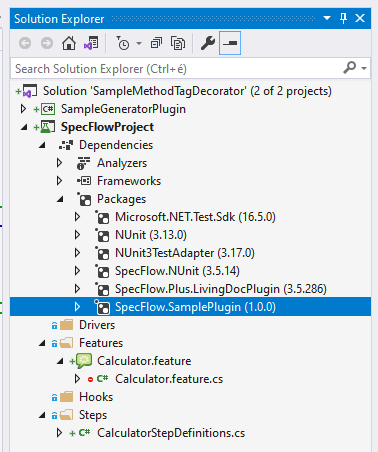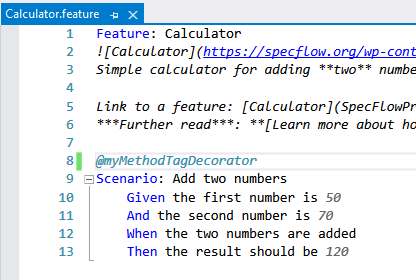Decorators¶
SpecFlow supports decorators which can be used in feature files. Decorators can be used to convert a tag in a feature file to an attribute in the generated code behind file.
Example decorator¶
Say we want to add an NUnit Apartment attribute to a test method in the generated code behind file (a file with extension .feature.cs) to specify that the test should be running in a particular apartment, either the STA or the MTA.
For this, we can use a decorator which we need to register in a generator plugin so that the decorator can have its effect during the code behind file generation.
Steps to follow:
Create a SpecFlow project with test framework NUnit using the project template provided by the SpecFlow Visual Studio extension. Learn more
Create a GeneratorPlugin. You can follow the steps here or you can use the sample generator plugin project as a basis
Create a Decorator (which is a class which implements interfaces like
ITestMethodTagDecorator,ITestMethodDecorator, etc.):ITestMethodDecoratoris called alwaysITestMethodTagDecoratoris called only if the scenario has at least one tag
public class MyMethodTagDecorator : ITestMethodTagDecorator { public static readonly string TAG_NAME = "myMethodTagDecorator"; private readonly ITagFilterMatcher _tagFilterMatcher; public MyMethodTagDecorator(ITagFilterMatcher tagFilterMatcher) { _tagFilterMatcher = tagFilterMatcher; } public bool CanDecorateFrom(string tagName, TestClassGenerationContext generationContext, CodeMemberMethod testMethod) { return _tagFilterMatcher.Match(TAG_NAME, tagName); } public void DecorateFrom(string tagName, TestClassGenerationContext generationContext, CodeMemberMethod testMethod) { var attribute = new CodeAttributeDeclaration( "NUnit.Framework.ApartmentAttribute", new CodeAttributeArgument( new CodeFieldReferenceExpression( new CodeTypeReferenceExpression(typeof(System.Threading.ApartmentState)), "STA"))); testMethod.CustomAttributes.Add(attribute); } public int Priority { get; } public bool RemoveProcessedTags { get; } public bool ApplyOtherDecoratorsForProcessedTags { get; } }
Register the Decorator in the
Initializemethod of the GeneratorPlugin:public void Initialize(GeneratorPluginEvents generatorPluginEvents, GeneratorPluginParameters generatorPluginParameters, UnitTestProviderConfiguration unitTestProviderConfiguration) { // Register the decorator generatorPluginEvents.RegisterDependencies += RegisterDependencies; } private void RegisterDependencies(object sender, RegisterDependenciesEventArgs eventArgs) { eventArgs.ObjectContainer.RegisterTypeAs<MyMethodTagDecorator, ITestMethodTagDecorator>(MyMethodTagDecorator.TAG_NAME); }
Install the GeneratorPlugin NuGet package to the SpecFlow project. Once the installation finishes, it should look like this:

Add tag
@myMethodTagDecoratorto the feature file:
Build the solution
Check the generated code behind file (
.feature.cs) if it contains the NUnitApartmentattribute:
You can find the complete Decorator example on GitHub.
Further read¶
NUnit
Apartmentattribute: https://docs.nunit.org/articles/nunit/writing-tests/attributes/apartment.htmlApartments: https://docs.microsoft.com/en-us/windows/win32/com/processes–threads–and-apartments